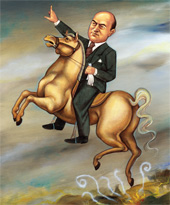My colleague Paul Fischbeck is in the news for calculating the incremental risks from driving a Toyota with an accelerator problem. According to his press release:
In the U.S., there is a little more than one fatality for every 100 million miles driven. The average U.S. vehicle logs about 13,000 miles each year. Based on these averages, for the 2.3 million Toyotas being recalled, there are about 340 fatalities every year for causes unrelated to the accelerator. The accelerator problem is adding about six deaths every year to this total — meaning that the accelerator problem is increasing the driving risk by about 2 percent.
So there’s a meat-and-taters public policy question for you — do the benefits of fixing the problem justify the costs of a massive recall? To put this in context, a 2 in a million chance is about the same as flipping a coin 19 times and getting heads every time.
See you in 240.
 Well, the future of pedagogy has arrived in the form of
Well, the future of pedagogy has arrived in the form of  Jay Dansand and the gang for transporting the site.
Jay Dansand and the gang for transporting the site.